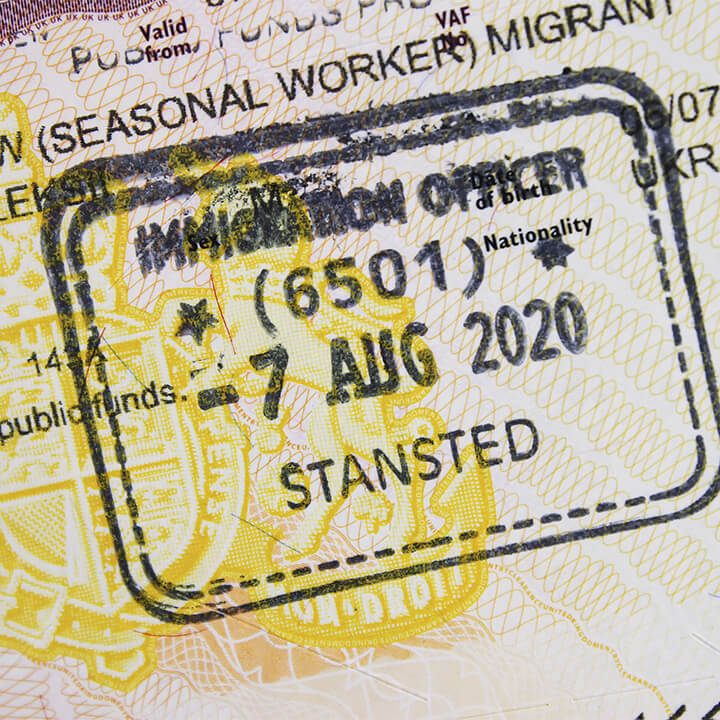Right to Work Checks Change From 1 July 2021
2nd July 2021
On 30 June 2021, the Brexit grace period came to an end and the deadline for eligible European nationals to apply to the EU Settlement Scheme (EUSS) has now passed. EEA nationals now require valid permission to live and work in the UK and must be able to provide evidence of this in the same way as other overseas nationals.
As a result, the Home Office has published new guidance on right to work checks which came into effect on 1 July 2021, and must be followed by all employers from this date.
What’s new?
Employers must continue to carry out right to work checks before employees start work – the general requirements to obtain, check, copy and retain documents have not changed. Some of the key changes can be seen in List A and List B, which are found at Annex B to the latest version of the Home Office’s guidance on right to work checks. List A sets out documents which demonstrate the right to work for the duration of employment and do not require a repeat check. List B documents, on the other hand, will require a repeat check because the individual’s right to work in the UK has a time limit on it, or an application is pending.
Points to note include:
- Perhaps most importantly, EEA and Swiss passports/national ID cards are no longer suitable to demonstrate the right to work in the UK. Instead, evidence of status or pending applications under the EUSS will need to be provided.
- Ireland is the one exception to this rule, and Irish passports/ID cards have been added to List A.
- Frontier Worker Permits have been added to List B. In practice these will largely be electronic documents and require a share code to perform an online check, but physical documents may be issued in some circumstances.
- Various documents relating to family members of EEA nationals (such as permanent residence cards) have been removed from both lists – a document demonstrating pre-settled or settled status under the EUSS will be required in most cases.
Transitional measures have also been put in place until 31 December 2021 in relation to employees who were employed before 30 June 2021 but have failed to apply under the EUSS by this date. These provide employers with a process to assist such employees in obtaining status under the EUSS within 28 days without the need to terminate their employment, or to otherwise end their employment if an application is not made within this timeframe.
Why does it matter?
An employer who has carried out a compliant right to work check will obtain a “statutory excuse” against a civil penalty if the employee is later found not to have the right to work in the UK. The civil penalty can be as much as £20,000 per illegal worker, and there may also be criminal sanctions in serious cases (generally where the employer has knowingly employed illegal workers).
What should employers be doing?
- Make sure that policies and procedures are updated and staff who will be carrying out right to work checks are aware of the changes.
- Ensure that employees are not only familiar with manual right to work checks, but also online right to work checks and using the Employer Checking Service. The Home Office is increasingly moving towards online checks, therefore staff may require guidance on how to conduct these. If using the Home Office’s right to work checklist for a manual check, make sure that it is the most recent version and that employees know where to find this.
- Continue to communicate with existing EEA and Swiss employees to identify any individuals who may need to take advantage of the transitional provisions. It is not necessary to carry out retrospective right to work checks on any European nationals employed during the grace period, but employers can do so if they wish (and provided that such checks are not carried out in a discriminatory manner).
- Do not employ EEA nationals after 1 July 2021 if they have not applied to the EUSS by the deadline and cannot otherwise demonstrate alternative immigration status in the UK, or meet the requirements for sponsorship under the points based immigration system.
- However, care should be taken to avoid discrimination. Immigration status should be considered toward the end of the recruitment process and at the same stage for all applicants.
- Remember that the COVID-19 concessions for right to work checks have been extended and will now expire on 31 August 2021 (see our previous article here). In the meantime, right to work checks can be performed by obtaining photographs/scans of the documents, checking them via video call with the individual, copying them and recording the date/the fact that an altered right to work check has been carried out.
- Log the earliest date on which employees with pre-settled status may become eligible for settled status, and remind employees to make their settled status applications as soon as they become eligible.
The Walker Morris Business Immigration team is experienced in advising employers on conducting legally compliant right to work checks and can assist in navigating the changes which came into force on 1 July 2021. For further information regarding any of these issues, please contact Shabana Muneer or another member of the Walker Morris Business Immigration Team.



